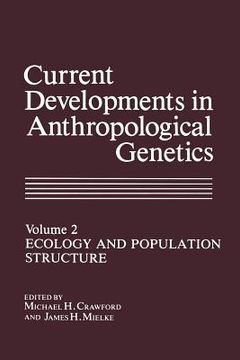Share
Current Developments in Anthropological Genetics: Ecology and Population Structure
Michael H. Crawford
(Author)
·
James H. Mielke
(Author)
·
Springer
· Paperback
Current Developments in Anthropological Genetics: Ecology and Population Structure - Crawford, Michael H. ; Mielke, James H.
Choose the list to add your product or create one New List
✓ Product added successfully to the Wishlist.
Go to My Wishlists
Origin: U.S.A.
(Import costs included in the price)
It will be shipped from our warehouse between
Thursday, August 08 and
Tuesday, August 20.
You will receive it anywhere in United Kingdom between 1 and 3 business days after shipment.
Synopsis "Current Developments in Anthropological Genetics: Ecology and Population Structure"
This volume examines the interrelationship of ecology, subsistence pat- terns, and the observed genetic variation in human populations. Hence, the book is divided conceptually into the following categories: nonhuman primates, hunters and gatherers, nomads, swidden agriculturalists, peas- ant farmers, religious isolates, and modern and urban aggregates. While many of these populations have experienced (and are experiencing) ac- culturation as a result of contact with technologically more advanced groups, the genetic structures described in this volume attempt to recon- struct the traditional patterns as well as genetic changes because of con- tact. Most chapters also integrate biological (genetic), social, and de- mographic data within an ecological frame thus presenting a holistic view of the population structures of ecologically distinct groups. The first chapter examines the body of early nonhuman primate lit- erature that emphasized ecological determinism in effecting the popula- tion structure of our primate ancestors-relatives. It also examines more recent literature (since 1970) in which it became apparent that greater flexibility exists in primate social structure within specific environmental frameworks. Thus, it appears that our nonhuman primate evolutionary heritage is not one of ecological determinism in social organization but one of flexibility and rapid change suggesting the evolutionary success of our species is based upon a system of flexibility and that social ad- aptations can be accomplished in a number of diverse ways.
- 0% (0)
- 0% (0)
- 0% (0)
- 0% (0)
- 0% (0)
All books in our catalog are Original.
The book is written in English.
The binding of this edition is Paperback.
✓ Producto agregado correctamente al carro, Ir a Pagar.

